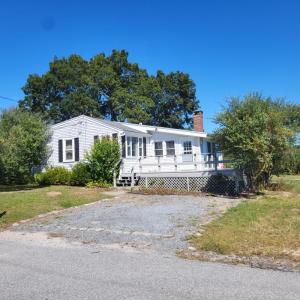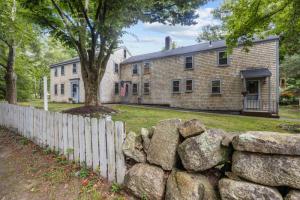Davoll’s General Store celebrates the Bard of Scotland
 In celebration of Scottish poet Robert Burns, Sam Manley plays a bagpipe version of “Auld Lang Syne,” a song commonly sung on New Year’s Eve. The event was held on Jan. 25 at Davoll’s General Store. Photos by Justice Burnaugh
In celebration of Scottish poet Robert Burns, Sam Manley plays a bagpipe version of “Auld Lang Syne,” a song commonly sung on New Year’s Eve. The event was held on Jan. 25 at Davoll’s General Store. Photos by Justice Burnaugh Bob Smith reads the poem “To A Mouse” by Robert Burns.
Bob Smith reads the poem “To A Mouse” by Robert Burns. Mary Beth Soares and Joan Akin perform the Scottish folk song “Dainty Davie.”
Mary Beth Soares and Joan Akin perform the Scottish folk song “Dainty Davie.”
 Davoll’s General Store hosted its third annual Burns Night in celebration of 18th Century Scottish poet Robert Burns.
Davoll’s General Store hosted its third annual Burns Night in celebration of 18th Century Scottish poet Robert Burns. In celebration of Scottish poet Robert Burns, Sam Manley plays a bagpipe version of “Auld Lang Syne,” a song commonly sung on New Year’s Eve. The event was held on Jan. 25 at Davoll’s General Store. Photos by Justice Burnaugh
In celebration of Scottish poet Robert Burns, Sam Manley plays a bagpipe version of “Auld Lang Syne,” a song commonly sung on New Year’s Eve. The event was held on Jan. 25 at Davoll’s General Store. Photos by Justice Burnaugh Bob Smith reads the poem “To A Mouse” by Robert Burns.
Bob Smith reads the poem “To A Mouse” by Robert Burns. Mary Beth Soares and Joan Akin perform the Scottish folk song “Dainty Davie.”
Mary Beth Soares and Joan Akin perform the Scottish folk song “Dainty Davie.”
 Davoll’s General Store hosted its third annual Burns Night in celebration of 18th Century Scottish poet Robert Burns.
Davoll’s General Store hosted its third annual Burns Night in celebration of 18th Century Scottish poet Robert Burns.The bagpipes bellowed and the pints flowed at Davoll’s General Store as people paid tribute to 18th century Scottish poet Robert Burns on Jan. 25.
Known as the bard of Scotland, farmer and poet Robert Burns is celebrated across the world for his poetry and lyrics that speak to classism, privilege and poverty.
Much of his poetry focused on the plight of the working class Scottish people. Joining millions of proud Scots across the globe, Davoll’s General Store hosted its third annual “Burns Night” on Thursday evening.
One after another, people stood up to read or sing their favorite Burns poems. Among the many people to pack into Davoll’s General Store was Carter Wilkie who read “A Man’s a Man for a’ That,” a poem that laments classism while arguing that people should be valued by their character rather than their wealth. Wilkie said he’s proud of his Scottish heritage.
“Burns night is a real major holiday for Scots in Scotland, but also for the Scottish diaspora all over the world,” Wilkie said. “It’s a night where Scots come together and celebrate camaraderie, fellowship and Scottish culture by memorializing Robert Burns as the national bard of Scotland. It’s kind of like for Scots what St. Patrick’s Day is for the Irish.”
In 1796, deep in debt and sick with rheumatic fever, Burns died at the young age of just 37. Today, people celebrate Burns Night every Jan. 25 by drinking beer and reading or singing his hundreds of poems and songs in their best Scottish accents. Much of Burns’ work is written in the Scottish dialect.
Most have probably heard a Burns poem even if they don’t know that he wrote it. The most popular song of his is Auld Lang Syne, popularly sung on New Year’s Eve when the clock strikes midnight: “Should auld acquaintance be forgot / And never brought to mind?”
Another popular Burns poem is “To A Mouse,” best known for its line, “The best laid schemes o’ Mice an’ Men,” which speaks to the futility of making plans and life’s unpredictable twists and turns. It inspired the title of the famous John Steinbeck novel.
Joan Akin, having first discovered Robert Burns when she was in college, has not missed a Burns Night in over 25 years. This year, joined by her friend Mary Beth Soares, Akin performed the traditional Scottish folk song “Dainty Dave.” Akin said that she likes Burns because his poetry relates to regular people.
“He was a man of the people, a common man,” Akin said.
Wearing a kilt and nursing a glass of single malt scotch, Dock Murdock said his Scottish ancestors came to America in 1802, where they settled in Pictou, Nova Scotia, a little town that came to be known as the birthplace of New Scotland. Murdock’s Scottish ancestors were members of Clan MacDonald, he said, one of the many clans that controlled Scotland for centuries.
This was Murdock’s first time attending a Burns Night at Davoll’s General Store.
“He spoke for all the people of Scotland, and he gave them a voice that let them celebrate their culture,” Murdock said of Burns’ poetry. “He let Scottish people be proud to be Scottish.”
Murdock is a musician who plays folk music and bluegrass. Scottish immigrants who settled in the Appalachian mountains have contributed a lot to folk music’s roots, he explained. Murdock said that Burns Night is a great reason to get out of the house and sing with friends.
“It’s also a wonderful excuse to have a good, wee dram of single malt scotch,” he said.




































